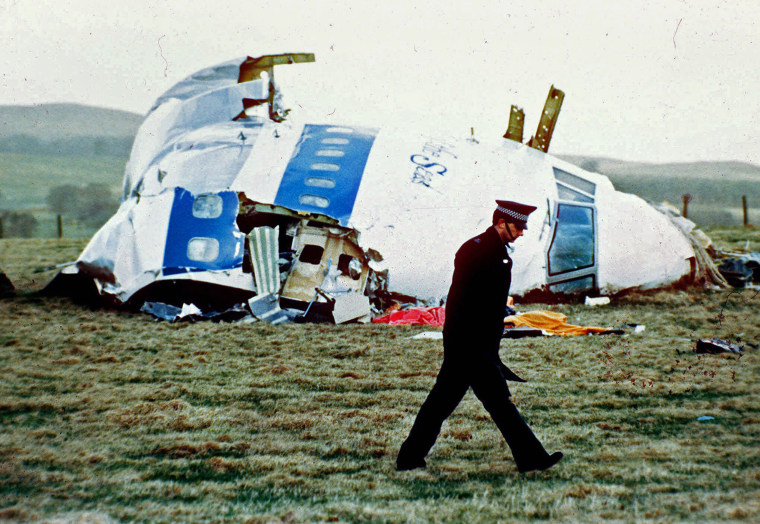A Libyan man suspected of making the bomb that blew up a passenger plane over the small Scottish town of Lockerbie in 1988 is in U.S. custody, authorities in the U.S. and Scotland said Sunday.
“The United States has taken custody of alleged Pan Am Flight 103 bombmaker Abu Agila Mohammad Mas’ud Kheir Al-Marimi,” a Justice Department spokesperson said. “He is expected to make his initial appearance in the U.S. District Court for the District of Columbia.”
In a separate statement, Scotland’s Crown Office and Procurator Fiscal Service said that the victims' families had been told that Mas'ud was in U.S. custody.

It was unclear how he had arrived in U.S. hands.
Pan Am Flight 103, traveling from London to New York, exploded over Lockerbie on Dec. 21, 1988, killing all 259 people, including 190 Americans, on board the plane and another 11 on the ground. It remains the deadliest terror attack on British soil.
The plane exploded at 31,000 feet above ground, 38 minutes after takeoff, and crashed in Lockerbie, a small town in southwest Scotland, about 80 miles south of the capital city of Edinburgh.
In 2001, former Libyan intelligence officer Abdelbaset al-Megrahi was convicted of the bombing at a special court in the Netherlands overseen by three Scottish judges and no jury. He is to date the only person convicted in the attack.
He lost one appeal and abandoned another before he was freed in 2009 on compassionate grounds because he was terminally ill with cancer. Still protesting his innocence, he died in Libya three years later.
Another Libyan intelligence operative, Lamen Khalifa Fhimah, was acquitted of all charges.
The Justice Department charged Mas’ud with two criminal counts related to the bombing on the 32nd anniversary of the attack in December 2020.
At the time, the Justice Department said that Mas’ud had worked in various capacities for Libyan intelligence, including as a technical expert in building explosive devices, from approximately 1973 to 2011. It also alleged Mas’ud was involved in the 1986 bombing of the LaBelle Discotheque in West Berlin that killed two U.S. service members.
The charges were brought three years after U.S. officials in 2017 received a copy of an interview that Mas’ud had given to Libyan law enforcement in 2012 after he was taken into custody following the collapse of the regime of Moammar Gadhafi, the country's longtime ruler.
In that interview, U.S. officials said that Mas’ud admitted building the bomb in the Pan Am attack and working with two other conspirators to carry it out.
He also said the operation had been ordered by Libyan intelligence and that Gadhafi thanked him and other members of the team after the attack, according to an FBI affidavit filed in the case.
Mas’ud will now become the first Libyan operative to be tried on American soil in connection with the bombing.
"This year marks the 34th anniversary of the Pan Am 103 bombing, which claimed 270 lives, including 35 Syracuse University students returning from studying abroad," Syracuse University Chancellor Kent Syverud said in a statement Sunday afternoon. "Today’s news is a significant milestone in a decades-long process to bring those responsible for this despicable act to justice. The Syracuse University community stands with all the victims’ families, friends and loved ones who have continued to seek justice for more than three decades. We remain steadfast in our commitment to remember, honor and reflect on the legacy of the lives lost.”